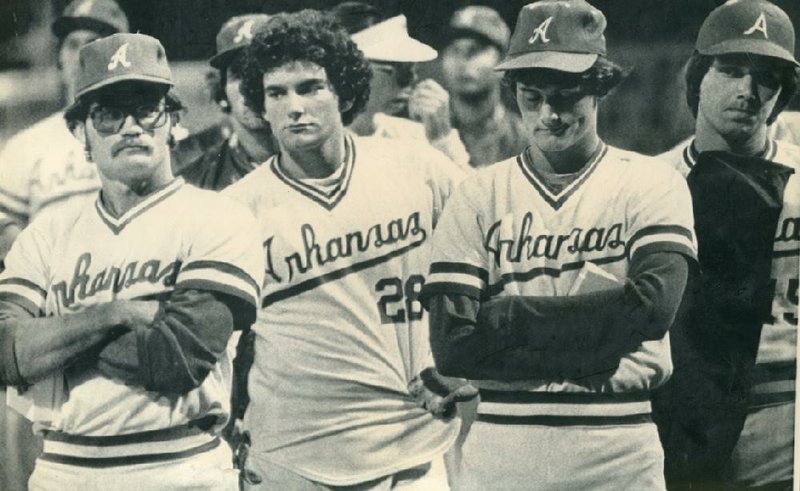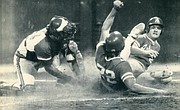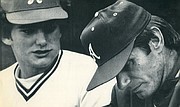FAYETTEVILLE -- The 1979 University of Arkansas baseball team broke ground in many ways.
Sometimes unruly and unconventional but always ultra-competitive for 10th year coach Norm DeBriyn, those Razorbacks went where no previous Arkansas team had: The pinnacle of their sport at the College World Series in Omaha, Neb.
The Razorbacks started 3-0 in the 1979 College World Series before losing back-to-back games against Cal State Fullerton and finishing as the national runner-up. That remarkable run took place 41 years ago this week.
"I think we put Arkansas baseball on the map," DeBriyn said last week of the 1979 season. "I remember we were in Sports Illustrated ... and every game was televised on [KATV] Channel 7 out of Little Rock.
"So the electricity and the interest in Arkansas baseball just really popped up. It was a stepping stone for us."
Those Razorbacks finished 49-15 and won every Southwest Conference series except for their opening three-game set against Texas, though the Hogs would get the last laugh in that head-to-head battle against their burnt orange rivals.
Kevin McReynolds, a freshman outfielder from Sherwood on that team, had this to say when asked about his memories of 1979.
"That we did not win," said McReynolds, who went on to have a 12-year career in the majors. "We were the better team, there's no doubt in my mind. That's the only bummer out of the whole thing."
McReynolds, who hit eight home runs and batted .282 that season, also recalled the overall strength of those Razorbacks.
"We had a really good team that year," he said. "I mean, our season was pretty much a run. ... How it was in the World Series was just pretty much a microcosm of the season itself."
Switch-hitting second baseman Johnny Ray, who hit .328 with 6 home runs and a team-high 47 RBI, called the Hogs' season a magical run.
"Getting to Omaha, a lot of people didn't expect us to do that," said Ray, who played 10 seasons in the majors. "We kind of got on a roll in the playoffs and just kind of kept it going all the way to Omaha."
Freshman pitcher Scott Tabor, who went 10-2 with a 3.59 earned-run average, said the Razorbacks overcame many doubters.
"It was a very, very talented team that nobody knew was a talented team," Tabor said. "In the regionals [at Florida State] when we went there, nobody gave us a chance to win a game, and we went ahead and swept through that thing.
"We just had some guys, especially like Johnny, who was a switch-hitting, doubles-hitting fool, and nobody really knew about him. ... McReynolds was a freshman and nobody knew about him. We just had a lot of really unknown talents that came together that year. It was one of those magical things. It was a lot of fun."
The Razorbacks had played later than May 15 only one other time -- a bid to the NCAA regional tournament as a baseball independent in 1973 -- and had never played into June before their big run in 1979.
"We ended up getting better as the season went along," DeBriyn said. "I was just hoping we'd get an NCAA bid and we almost win the national championship. It was amazing."
The 1979 Razorbacks went 19-5 in the Southwest Conference for a second-place finish, had a team batting average of .303, nearly 100 points higher than their opponent's average (.211), and they outscored opponents 393-215.
Six regulars hit .300 or better: First baseman and designated hitter Ed Wallace (.357), shortstop Larry Wallace (.348), catcher Ronn Reynolds (.347), outfielder and team captain Marc Brumble (.328) and first baseman John Hennell (.318) joining Ray. Arkansas more than doubled its opponents with 47 home runs compared to 23 allowed and piled up a 202-96 advantage in extra-base hits.
The pitching staff boasted three 10-game winners in Rich Erwin (13-3, 2.32 ERA), Steve Krueger (10-2, 1.73) and Tabor (10-2, 3.59), a rarity in that day, and the trio combined for 25 complete games, 11 of them by the lefty Krueger.
DeBriyn, who would go on to coach at Arkansas for another 23 years, said he thought those Razorbacks were talented, fun and hard-working, but they could also get feisty. Sometimes the rollicking fun spilled over into family squabbles, he recalled.
In the Razorbacks' CWS opener against Pepperdine, also a first timer in Omaha, Erwin, the right handed staff ace, struggled through a three-run top of the first inning. DeBriyn remembers his conversation with pitching coach Tom Hilton in the dugout as the rocky inning was coming to a close.
"I told Tom Hilton, 'Get Krueger ready, he's going to go in the next inning. We're going to get killed,' " DeBriyn said. "Hilton looked at me and said, 'You're telling Erwin.'
"We were lucky we were only down 3-0 going into the bottom of the first. I said [to Erwin] 'We're going with Krueger.' Erwin said, 'No!' And I said, 'Yes!'
"I said, 'You know, you haven't thrown that many pitches, they've got a lot of left-handed batters in the lineup and it's a better matchup and blah, blah, blah.' He was so upset, he and I had to go behind the dugout in the dressing room to settle it. I mean, I said, 'Calm down. This is a decision that I've made.' We lucked out."
The decision wound up being monumental.
Krueger held Pepperdine in check and the Razorbacks won 5-4.
Two days later, Erwin came back and throttled Arizona in Arkansas' 10-3 victory.
"Erwin sticks it up their butts and he gives me the ball at the end of the game and he said, 'Here! Here's the ball,' " DeBriyn said, "And I'm thinking, 'That's the best coaching move I ever made.' We were fortunate with that."
In Arkansas' 4-3 victory over Delaware to clinch the six-team regional in Tallahassee, Fla., DeBriyn remembered having a quick mental debate on whether to wave around Rob Kauffman with the go-ahead run late in the game.
"It was a bang-bang play at the plate. I'm coaching third base and I remember thinking, 'Do I bring him home or hold him?' " DeBriyn said. "I just thought we'd roll the dice.
"Kauffman told me later, 'If you had put up a stop sign, I wasn't going to stop anyway.' They were that kind of team. They were not easy to coach. They had a mind of their own."
The Razorbacks crushed Texas 9-4 in the winner's bracket final and would not face the Longhorns again in Omaha.
Meanwhile, Cal State Fullerton bounced back from a 6-1 loss to Mississippi State in its CWS opener to eliminate Connecticut 8-3 and Arizona 16-3.
In those days, the bracket was re-ordered when the final four teams were determined and Arkansas wound up paired against the Titans, while Pepperdine was eliminating Texas 6-4 on the other side of the semifinals.
Cal State Fullerton dealt the Hogs a 13-10 setback. Then, after the Titans eliminated Pepperdine 8-5, Arkansas and Fullerton met for a one-game final.
"Give Fullerton credit. They had to win their way through the loser's bracket and they did," McReynolds said. "The first game they beat us 13-10, which was just a slugfest.
"Overnight, a big cold front moved through there and the weather was completely different. The wind was blowing straight in the next day. We had our ace pitcher [Krueger] on the mound and felt good about it. They had a journeyman pitcher.
"You end up in a 2-1 game after a 13-10 game. The stars were aligned for us to win that game and we didn't win it, so shame on us."
The journeyman pitcher was Dave Weatherman, who held the Hogs to four hits.
"I've said all along that it takes a championship effort to win the national championship," Fullerton Coach Augie Garrido said that day. "What you saw tonight was a championship game by Dave Weatherman."
Weatherman, who had gotten knocked out in the first inning of the Titans' 8-5 victory over Pepperdine, kept his fastball and curveball low in the zone against Arkansas.
"He had a fastball, then he'd throw that deuce [curveball] down low and he had a pretty good change-up," Reynolds said that day. "We just didn't get the hits."
The Razorbacks almost didn't make it to Omaha, and DeBriyn said he would've owned up to it if they hadn't.
DeBriyn's self-deprecating wit is well-known, and he admitted some words of his own nearly cost him after the Razorbacks' lost in the Southwest Conference Tournament final at Texas, but earned an at-large bid to the 34-team NCAA Tournament.
That season, the NCAA Tournament consisted of seven four-team regionals and one six-team regional. Arkansas was sent to the six-team grouping at Tallahassee and was paired against George Washington University in the first round.
"I was so excited when we got a bid and talking to the media before the tournament ever started. ... I made a comment that we were playing George Washington and I said, 'I thought George Washington was dead,' " DeBriyn said.
"I should have never ever said that because it was on every wall you could imagine. We won that first game. I don't think our catcher caught more than one or two balls in that whole first inning. We lucked out and won it 12-11 just because the players overcame my stupidity and they could really swing the bats. We ended up winning that game, thank goodness."
In fact, Arkansas went 4-0 in Tallahassee, smoking Florida 9-1 in the winner's bracket, then beating Delaware twice, 8-6 and 4-3, to qualify for its first CWS.
"We convinced the committee we were one of the better teams in that nation at that time," Ray said. "We got a bid to Tallahassee, and it just kind of fell into place. We started hitting and getting great pitching, and it just kind of snowballed from there."
With baseball blue bloods like Texas, Arizona and Miami in the CWS field, the Razorbacks definitely felt like a Johnny come lately.
"Looking back on it, it was kind of comical," Tabor said. "Like Miami was there and Texas was there ... Arizona. People who were there every year and were perennial powerhouses.
"I remember Miami, they were just a bunch of arrogant SOBs. They've got walk-around-the-hotel uniforms. They've got team shirts for this and team shirts for that, their pre-game workout uniform. Everything was just top end, and Texas was the same way.
"We're out there and we all had gray sweat pants and shirts that had silhouettes of a football with a number on it, which is how you knew it was yours. That's what we were issued was hand-me-down football sweats. So those were our pregame or workout stuff."
Tabor recalled a picture of the Razorbacks at practice in Omaha, and most of the players were wearing shorts and no shirts.
"You watch [the Razorbacks] now and we're the best-dressed team everywhere," he said. "I love watching the progression of the team to where they are now from where we were then.
"We weren't even supposed to be there. We just kind of played with a chip on our shoulder and went out and just won. Just played good baseball. All of a sudden everyone looks up and we're in the finals, undefeated, and they go, 'How the hell did that happen?' "
Sports on 06/05/2020


